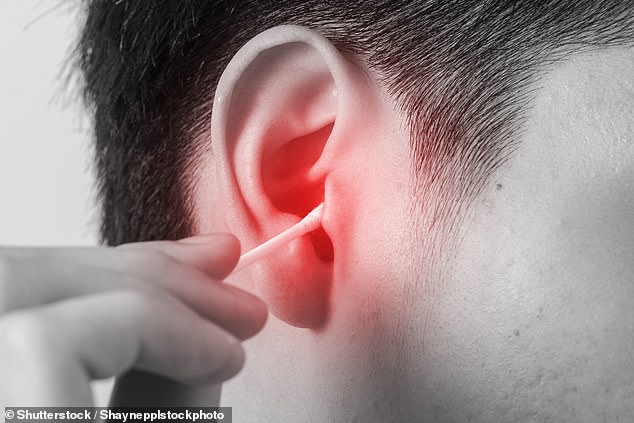Hygiene mistake that MOST of us make is triggering life-ruining tinnitus, expert warns
Hearing experts have warned against the popular habit of poking ears with a cotton bud - as the tool could damage the eardrum and even trigger tinnitus.
Specialists say the small stick often ends up pushing wax into the ear canal, where it presses against the eardrum and blocks the auditory canal, triggering a ringing, clicking, pulsing, humming or rushing sound.
Tinnitus affects up to ten million sufferers in the UK and involves a patient hearing these unusual sounds frequently - often 24 hours a day.
Around 500,000 in the UK have a 'debilitating' version of the condition, according to tinnitus specialist Frank McGarth, which leaves them unable to work and sleep.
Tinnitus can be so severe it may lead to depression, alcoholism, addiction and even suicide.
Frank, owner of Tinnitus Care Clinics, is raising awareness of the common ways a person can inadvertently damage their hearing as part of Tinnitus Awareness Week.
Thrillseekers are also at risk, as pressure from planes and water during watersports run the risk of damaging and even bursting eardrums, resulting in tinnitus.
Frank advises fliers to try to induce yawning and swallowing to 'pop' their ears when they feel they are blocked during a flight.

Using a cotton bud to remove wax is likely to push the debris towards the ear canal, causing damage, experts say
Loud music at concerts is another culprit, with Frank urging music lovers to stay well away from the speakers while enjoying their favourite band.
Even when not attending gigs, he advises against using headphones to drown out environment noises, as music above recommended volume can harm the eardrum.
'Cotton buds are dangerous,' he said. 'They are not designed for a person to blindly poke their own ear when they can't see where it's going.
'You might get some wax out but you're pushing more into your ear drum.
'See a professional, whatever it costs. It is far less costly, in the long run, than suffering unnecessary damage to your ear or hearing.'
One of Frank's patients Brendan Farrell, from Drogheda, Ireland, suffered chronic tinnitus that caused him to be troubled by a constant sound akin to a very loud dog whistle.
The condition impacted Brendan's everyday hearing and resulted in bouts of depression, for which he was prescribed antidepressants and sleeping tablets.
Frank's treatment for Brendan included a QNAS (Quietness via Neuro Auditory Stimulation), a new type of method that involves using white noise devices to teach patients to 'tune out' of the irritating sound in their ears.
Brendan's treatment has transformed his life and he now feels 'reconnected with life, friends and family'.
Brendan said: 'I can now hear and enjoy everyday sounds such as leaves rustling, the TV and incoming phone calls.
'The tinnitus is much more manageable now and my new-found feeling of connectivity has made a massive difference to my life.'
Research by charity Tinnitus UK last week revealed that patients with the distressing condition are facing delays of up to three years for specialist appointments.
Even when patients finally get treatment, 60 per cent of doctors are not able to offer standard levels of care because of staffing shortages, the report found.
Last year a survey of nearly 500 people with tinnitus revealed that one in five had had thoughts of suicide or harming themselves in the previous year, while eight out of ten experienced low mood or anxiety.





























































































































































































































































































































































































